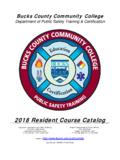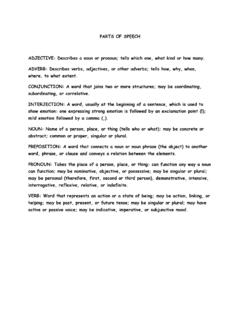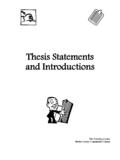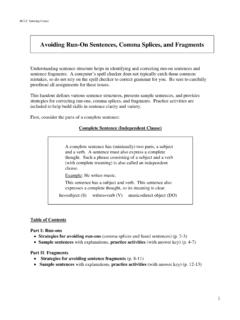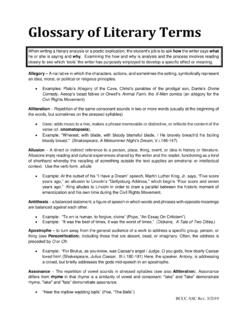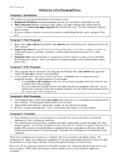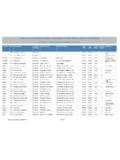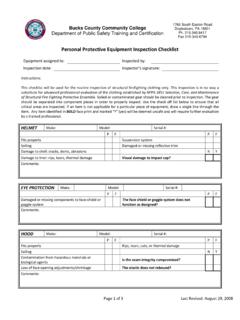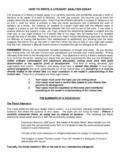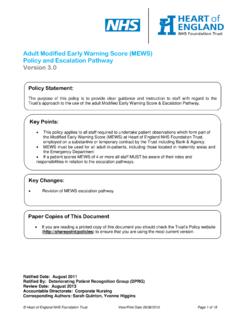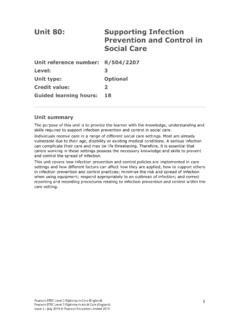Transcription of Note-Taking, Study Skills, Time Management Skills, and ...
1 BCCC ASC Rev. 3/2019 Note- taking , Study skills , time Management skills , and Test- taking Strategies Note- taking Take good class notes. In order to succeed in a class, you often need to take good notes. A professor s lecture often provides you with key information for the course. Staying organized while taking notes is just as important as note- taking itself because if you have good notes to Study from you will be more likely to do well. There are several strategies that will help you stay organized and take good notes. Use the Cornell method. Leave a margin on the left side of your paper, using the remaining space on the right to take notes. Skip a few lines in between each point your professor makes.
2 After class, write Study questions in the margin on the left. This will be useful when you review or Study for an exam: cover your notes with an additional sheet of paper, leaving only your Study questions uncovered. Answer your Study questions to the best of your ability. The following is an example of the Cornell method used in a science class: Class: Date: Leave " margin on left for questions to Study from later What are the 5 phases in mitosis? What happens in interphase? What happens in prophase? Leave approximately 6" here for notes. Do not worry about complete sentences, spelling, or grammar.
3 Just write enough to spark your memory later. 1. Interphase 2. Prophase 3. Metaphase 4. Anaphase 5. Telophase Chromatin Spreads into indistinct mass 1. Chromosomes condense into sets of chromatids. 2. Nucleolus and nuclear envelope disappear. 3. Spindle microtubules appear. Summary: In your own words, recount the information you took down. BCCC ASC Rev. 3/2019 Other methods of Note- taking Use abbreviations and shorthand to condense the amount of time it takes to write down information. This will ensure that you are able to write more quickly and thus take down more information. Another strategy is to organize your notes into an outline or a bulleted list, which will help you stay organized.
4 Study skills It is important to establish good Study skills and habits. Doing so will help you retain more material, be more prepared for tests and papers, and stay caught up in your classes. Use the SQ4R Method SURVEY the chapter before you begin to read it (focus on titles, graphs, charts). Turn the information into QUESTIONS. Read all QUESTIONS in the chapter. READ the chapter looking for the answers to the questions you developed. Reread any sections that aren t clear. RECITE the information in your own words; test yourself and how much you remember and can explain to another person. RELATE the information to something you already know.
5 RELATING the information to information you already know greatly increases your chance of remembering it. REVIEW the information by skimming the chapter or your notes periodically. Have a positive attitude. Your attitude can affect how well you learn and retain information. You can shut out information if you consider it boring or if you don t like the subject. To avoid this, set learning goals before you begin to Study . Find a good location for studying. A lot of time can be wasted by distractions. There are many quiet, comfortable Study areas on campus, including the library. Designating a location for studying will help you keep your mind focused on studying. Join a Study group.
6 Meet with classmates and discuss what you are doing in class. You will be very helpful to each other, especially if you work with each other s strengths and weaknesses. Review your work. This is one of the best ways to Study for a test, especially if you have taken good notes in class. Do some activities that will help you recall the information, such as creating a Study guide with questions and answers. Another useful review method is to repeat the information until you overlearn it. Involve multiple senses: read it aloud, write it down, and say it in your own words. This will increase your likelihood of remembering the information. Even if you ve already learned something, go over it one more time .
7 Keep your memory fresh. If you wait to review the information until the night before your test, you will have forgotten a great deal of the material and will have to Study longer. Reviewing the information on a regular basis after you have learned it will decrease your Study time and help you remember material much more easily. BCCC ASC Rev. 3/2019 Use Your Memory Use elaboration strategies such as summarizing, questioning, and using visual organizers. This will help you process information in a way that assists and ensures understanding. As a result, your brain will be able to file and retrieve information more easily. time Management skills Plan your time . A lot of students have other responsibilities outside of school, including jobs and families.
8 Be sure to set aside a few hours per day for schoolwork so that you don t fall behind in your classes. It is a good idea to keep a calendar for assignments and a daily To Do list. Create flash cards. These will allow you to review or Study anywhere, at any time . Carry your flash cards around and Study between classes, while on the train or a bus, or at a friend s house. Making the flash cards will help reinforce information, and review will help you remember it. This process will make studying for a test easier. Keep on top of the work in progress. Be sure to do all assignments and readings when they are given to you (and make up what you missed if you were away).
9 Be prepared from the very first day of class! Beat procrastination. The key to controlling and ultimately combating this destructive habit is to recognize when you start procrastinating, understand why it happens, and take active steps to better manage your time and outcomes. Break the project into a set of smaller, more manageable tasks. You may find it helpful to create an outline or a map like the one below. Set goals. Decide what you want to achieve in your classes. Is a good grade important to you? Do you want to improve certain skills ? Make a plan to reach these goals. Setting deadlines and reasonable tasks are good ideas. Be realistic about the times you can Study .
10 Many college students Study at night because that s the only time they could Study while attending high school. However, college students have chunks of non-class time during the day. If possible, retrain yourself to utilize this new time as best as possible. Know yourself and the times you are most awake. Visualize. For many people, a mental picture is clearer and easier to remember than words. For each major concept you want to remember, create a mental picture and then look at it carefully for a few seconds. Once you ve seen it clearly, you ll probably be able to recall it. Relax! Don t forget to spend time with family and friends or doing something you enjoy.
